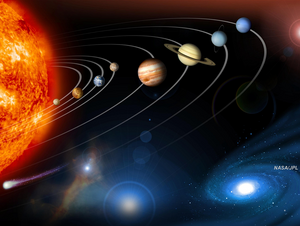There is one specification, Edexcel GCSE Astronomy. It can be taken by external candidates, but it has a practical component that must be signed off by the exam centre.
Edexcel GCSE Astronomy[]
Edexcel GCSE Astronomy page and specification
- Exams from: June 2019
- Available in June
- Specification code: 1AS0
Subject Content[]
The course content is split into two areas
- Naked eye astronomy which covers: Planet Earth, The lunar disc, The Earth-Moon-Sun system, Time and the Earth-Moon-Sun cycles, Solar System observation, Celestial observation, Early models of the Solar System, Planetary motion and gravity
- Telescopic astronomy which covers: Exploring the Moon, Solar astronomy, Exploring the Solar System, Formation of planetary systems, Exploring starlight, Stellar evolution, Our place in the Galaxy, Cosmology
The course also covers maths and observation skills
Assessment[]
100% exam based. However candidates are required to complete two observations for which the exam centre must sign a declaration - details here.
- Paper 1 - Naked eye astronomy - 1hr 45 mins - 100 marks - 50%
- A mixture of different question styles, including multiple-choice questions, short-answer questions, calculations, graphical and extended-open-response questions.
- Covers Naked eye astronomy topics
- Paper 2 - Telescopic astronomy - 1hr 45 mins - 100 marks - 50%
- A mixture of different question styles, including multiple-choice questions, short-answer questions, calculations, graphical and extended-open-response questions.
- Covers Telescopic astronomy topics
Non-Examined Assessment: 2 observations must be completed.
Resources[]
Edexcel specification page Click on 'teaching and learning materials' for a set of topic guides, a scheme of work, and a guide to observational skills.
Mickledore Publishing. Nigel Marshall publishes a variety of resources covering the 9-1 Astronomy GCSE specification, including the only main textbook available and accompanying worksheets and practice exam packs.
Past papers can be accessed through the specification page or here
Practical assessment: Observations[]
The candidate has to undertake two observations. These are not tests - the candidate isn't graded on them. However, you do have to do them in order to enter the exam. In addition, there are questions in the written exam to test your knowledge of observational procedures.
The head of the exam centre has to sign a declaration that:
" Each candidate has made a contemporaneous record of:
i. the work that they have undertaken during these observations, and
ii. the knowledge, skills and understanding which that candidate has derived from those "
You will need to discuss this with your exam centre. If you can provide externally verified evidence that you have undertaken the observations, they may be prepared to sign the declaration. For example, you could ask a tutor or official at a local astronomy society to witness you doing the observations, and to provide a signed statement that they have been carried out. You could also have a video and/or photos taken of the candidate doing the observations. You need to satisfy the exam centre that the observations have been done and that they can sign the declaration. Most exam centres won't usually get involved in authenticating practical components like this, so ask nicely, and be aware that they are doing you a favour if they agree.
Additional Resources[]
Space, Science and Astronomy for Home Educators - facebook group run by Alistair Leith, who also offers a distance learning course for GCSE Astronomy. However, the group is open to all - you don't need to be doing the course.
Planet Earth - GCSE Astronomy Distance Learning Course. This course used to offer a printed course which is posted out to you, with assignments to complete. Unfortunately it is no longer available, although you may still find course notes from previous students.
Space FM has evolved from the old gcseastronomy.co.uk site, which covered the old 2008-2016 GCSE specification. It has recently been updated to match the new specification, and now includes links for every specification point to the relevant section of the website - it's a great free resource for covering content.
PopAstro - the Society for Popular Astronomy . See the Young Stargazers section and a very helpful Forum. Popastro runs yearly meetings in different parts of the country, as well as weekends workshops for beginners.
Distance Learning[]
Many home-educated students study Astronomy GCSE successfully using just the textbook and free online resources, but some find a distance learning course suits their family better, or want to use a tutor occasionally for marking essays or past papers. Course providers can be found on the Distance Learning Providers page.

